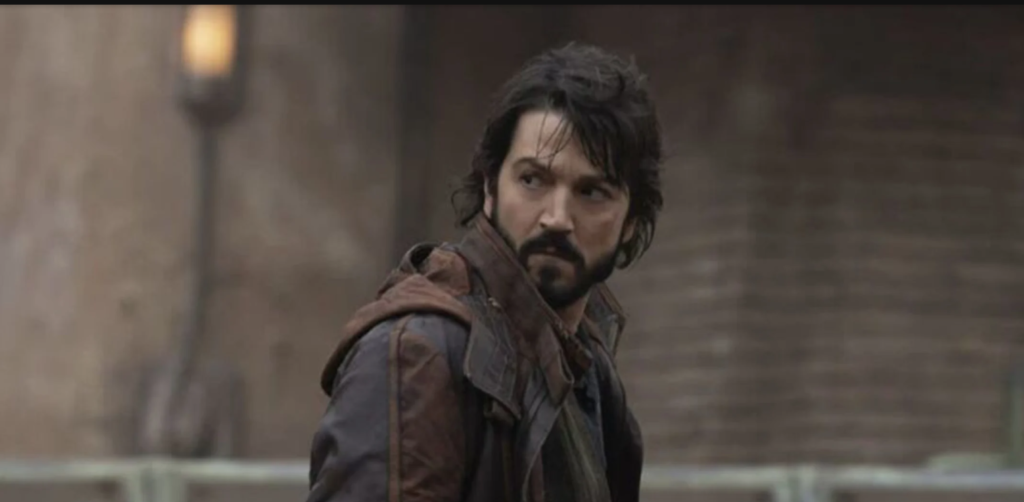Fans agree that Star Wars: Andor is superior storytelling and one of the best productions in the sci-fi franchise since the original 1977 film. While joining the chorus, TV critics are surprised that Andor is compelling and not puerile entertainment. In reviews they admonish “The Force” as a silly black-vs-white anachronism in Star Wars and laud Andor’s rugged war sensibilities for a more sophisticated audience. Yet the critics describe Andor as a dramatization of righteous rebels up against monolithic oppressors, a rather naive duality set in a less fanciful form. They dismiss Star Wars mysticism while inserting a belief system of their own: war as resolution. In a paradox worthy of a space opera, professional praise for Andor ignores the show’s discontents and historical knowledge of revolution.
Better not new
George Lucas in his first draft of Star Wars decades ago introduced political dynamics and mature character development alongside a spiritual and physical power dialectic he named The Force. Andor creator and writer Tony Gilroy concentrates on the human behaviors and political motivations underpinning the rebellion—with only a passing nod to the light vs. dark trope. The Jedi and their pseudo-religious power do not impact the daily life of the troubled protagonist, Cassian Andor. The series convincingly portrays ordinary people in crisis and seething from oppression. Gilroy cleverly draws upon real-world politics and global history to exhibit the wrenching and ambiguous nature of a revolution’s beginning.
Sword mightier than the pen
For some critics, The Force plays as a hackneyed spirituality that turned them off Star Wars, but Andor is firmly grounded in the authenticity of war. In her article for Salon, Melanie McFarlane writes that “abandoning the preciousness we carry for these deep space fairy tales” improves Andor “by framing it in a way we understand.” She gives the show a thumbs up because it jettisons the fable elements and focuses on “outlaws” resisting a totalitarian regime. At The Verge, Charles Pulliman-Moore calls the rebels “freedom fighters” and applauds the script writing for showcasing “what it really means for people to wage war against one another.” Stripped of sci-fi pretensions, he says Andor’s characters are best served by a war plot that is larger than themselves. In championing supposed seriousness over mythology, the critics fall into a pit of war puff. As Andor holds up a mirror to our society, all they see reflected is the unmistakable heft that war brings to storytelling.
Revolution’s spoils
To Gilroy’s credit, Andor artistically pulls from history. From England in 1066 to Iran in 1979, the process of revolution is fraught with contradiction, manipulation, and chaos. As public anger swells, revolutionaries have never been a unified, pro-democracy vanguard fighting the good fight. Elites, embodied by the enigmatic Luthen Rael in Andor, foments violence for cynical and strategic aims. Like any real revolutionary leader, he deploys nefarious mercenaries to take advantage of unstable regimes and stoke popular uprisings.
Ordinary people marching on the streets of the fictional planet Ferrix are quashed until one line breaks through, leaving a bloody trail of victims—taking cues from uprisings in mid-18th Century France or early-20th Century China. Senator Mon Mothma in her literal ivory tower is an apt stand-in for any number of actual opposition leaders who attempt to finesse revolutionaries, keep opportunists from seizing control, and avoid losing their own heads. The show’s heavy body count of main characters typifies true believers dying indiscriminately and innocent bystanders caught in the crossfire between rebels and counter-revolutionary forces. (As an aside, the number of black male actors in Andor who are killed off gives pause as to whether it’s a statement or unintentional parody). Cassian Andor’s evolution from a petty criminal to Rebel Alliance intelligence officer is a fair representation of the disparate motivations and long gestation period in political revolutions. Goals and tactics frequently contradict; outcomes take decades to evaluate; justice is rarely realized; and many bodies lie asunder every pyrrhic victory.
Missing the point
Across twelve episodes, Andor explores the devastating impact of political violence and a complicated trajectory of circumstances that force people to act. In a pivotal scene, Maarva, the Ferrix matriarch, calls on a gathering crowd to resist the Empire, and several characters are slaughtered and do the slaughtering in an ensuing street battle. In nearly every episode of Andor the narrative dances around perceptions, justifications, and exceptionalism of violence from multiple angles. Myopic TV critics accept war as an axiom. Their straight-forward analysis of people exacting change does not comport with what is on screen nor an objective view of social movements on planet Earth. Their disconnect could expose a political bias or, perhaps more likely, an unchallenged reliance on Hollywood conventions. Andor dares the audience with unresolved issues, while disoriented critics appear to mimic Saw Gerrera, the guerilla leader and anti-hero character in the show. When asked how to make sense of the various, competing insurgencies underway, Saw declares: “Let’s call it…war.”
Oblivious kudos
Glib aggrandizement by critics reduces Andor to war porn. The insightful writing, intimate performances, and enveloping production are mere decorations strung upon the pillars of war’s unquestionable “truths.” This may be all that is required for the casual channel surfer. For the thoughtful viewer, each episode inspires debates on ethics, politics, terrorism, violence, psychology, and the very definition of revolution. Graduate students for years to come will find a fertile landscape in Andor to sow allusions about the epistemology of war as portrayed in popular culture. Critics such as McFarland and Pulliman-Moore, however, live in an elementary universe. Like Stormtroopers snug in white uniforms, their misreading of Andor fits into the innate militarism of American entertainment. Believing that war expresses symmetry and veracity is a faith-based fantasy that belongs in a galaxy far, far away.
